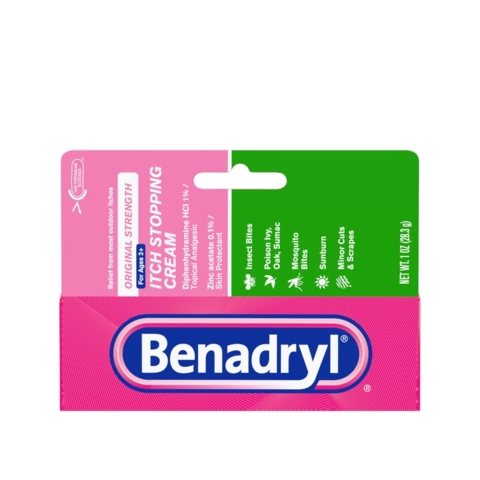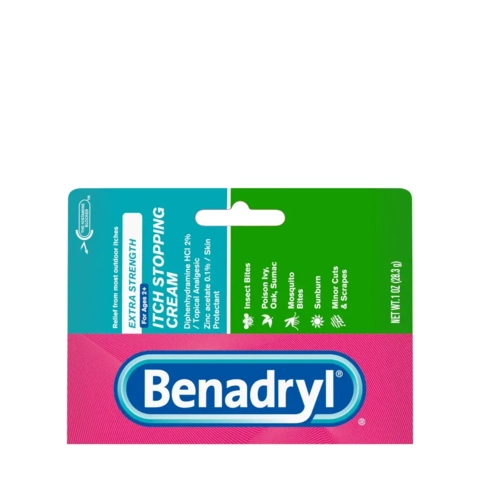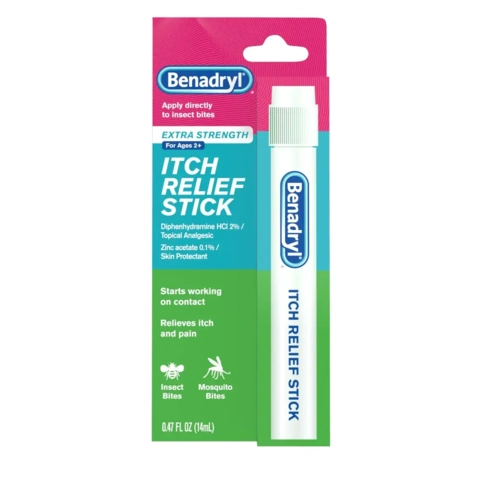What Causes Bug Bites To Itch?
When an insect bites your skin, it releases saliva, which causes your immune system to react and histamine to be released. As a result, the skin reacts around the bite and can become itchy, red, and swollen. Many insect bites can cause itchy skin, including bites from mosquitos, bedbugs, and ticks.
Signs You’ve Been Bitten by an Insect
If you have a bump or itchy spot on your skin, it might be from a bug bite. Bites from different bugs can look and feel similar, but sometimes different insect bites can cause different types of reactions. Here’s a handy chart to help you get to the bottom of your bite!
Bedbug
Bedbug bites cause a slightly swollen and red area that may itch and be irritating. They usually occur on the face, neck, hands, or arms. Bite marks can appear anywhere from one to several days after the bite.1
Bee
Bee stings cause pain, redness, and swelling for a few hours. The stinger will often be left in the wound, and it needs to be safely removed. Some people have a mild allergic reaction that can last for up to a week. In rare cases, serious allergic reactions need immediate medical attention. Symptoms of a serious allergic reaction include breathing difficulties, dizziness, and a swollen face or mouth.2
Chigger
Chigger bites usually occur in skin folds or on parts of the body where clothing is tighter. Bites can become itchy for 24 to 48 hours. Chigger bites may look like a red flat or raised lesion, and they may have a blister with pus. It may take up to two weeks for a chigger bite to completely resolve.3
Fire Ant
Fire ants aggressively sting, and they inject a venom that causes a burning sensation and a red, itchy bump. A blister with pus may form.4
Flea
Flea bites most often happen on the lower legs, ankles, or feet. Flea bites form small, itchy red welts on the skin.5
Hornet/wasp
Hornet or wasp stings feel like a sudden, sharp pain when they first happen. Then a swollen, red, painful, itchy bump can form on the skin that lasts for a few hours. Sometimes a larger area can become red and swollen because of a mild allergic reaction. In rare cases, serious allergic reactions need immediate medical attention. Symptoms of a serious allergic reaction include breathing difficulties, dizziness, and a swollen face or mouth.2
Mosquito
Mosquito bites form a raised, itchy, red skin bump. If you are traveling abroad, mosquito bites can sometimes spread serious illnesses.6
Spider
Spider bites form a small puncture mark on the skin, which can become painful, red, and swollen. Sometimes spider bites can cause you to sweat, become dizzy, or feel sick. Spider bites can become infected or cause severe allergic reactions that need immediate medical attention.7
Tick
Usually tick bites are not painful, and you may not immediately know you have been bitten. Ticks can attach to the skin and need to be safely removed as soon as possible using clean tweezers. Ticks can carry serious illnesses, such as Lyme disease or Rocky Mountain spotted fever. See a doctor if within a few weeks of a tick bite you develop fever, chills, aches and pains, or a rash that looks like a bullseye on a dartboard.8
Bug Bite Symptoms and Severe Reactions
Right after a bug bite, you might notice a bump or spot that can be itchy, painful, and annoying. While most bug bites cause only minor skin irritation, others can result in more serious symptoms.
If you’ve been outside, it may be hard to tell if itchy skin is from a bug bite, or because you brushed up against poison ivy, oak, or sumac. Learn more about poison ivy and other poison plants by visiting our guide.
The most common symptom of a bug bite is itchiness. The area around the bite may also become red and swollen.
If you think you’ve been bitten, here are some common symptoms to look for:
- Swelling
- Redness
- Itchy skin
- Pain
- Pimple-like spots
- Warmth
Sometimes an insect bite or sting can cause a severe reaction that requires immediate medical attention, particularly if you’ve had the unfortunate experience of being bitten or stung by many insects at the same time.
Symptoms of a severe reaction to an insect bite include:
- Trouble breathing
- Swelling of the face, lips, throat, mouth, or tongue
- Wheezing or trouble swallowing
- Fever
- Nausea or vomiting
- Stomach cramps
- Diarrhea
- Headache
- Racing heart rate
- Dizziness
- A red, donut-shaped rash that develops after a tick bite. This could be a sign of Lyme disease, which requires treatment by a doctor.
- A fever with a red or black spotty rash that spreads after a tick bite. This could be a sign of Rocky Mountain spotted fever, which requires treatment by a doctor.
See a doctor or healthcare provider immediately if you are experiencing severe symptoms from an insect bite.9
How to Prevent Mosquito and Other Bug Bites
Don’t let bugs stop you from exploring the great outdoors. Consider these tips to minimize insect bites whether you’re inside or outside:
- Wear clothes that cover exposed skin as much as possible while outdoors. This will help prevent bugs from crawling on you or biting you.
- Use insect repellant that contains 20%–30% DEET on exposed skin and clothing, especially if you are going to be somewhere with a lot of bugs.10 Follow the directions on the bottle.
- When your food smells good to you, there is a good chance it smells good to bugs, especially if it is sweet. Keep food and drinks covered to avoid inviting bugs to your picnic.
- When you are sleeping under the stars, use bed nets. Be sure to check that no bugs made their way inside the net before you go to sleep.
- Check yourself all over for ticks after being in areas where there are lots of them, like forests or tall grass. If you find a tick burrowed into your skin, remove it as soon as possible using tweezers to grab it by the head.
- If you are getting ready for a trip, make sure to look at travel warnings and recommendations about bugs in the area you are visiting.
Itchy Skin Relief for Mosquito and Other Bug Bites
Fortunately, you can treat most mild and common insect bite symptoms at home. Here are some tips:
- You’ll want to keep the bite area clean to prevent infection. Wash the affected area of your skin with soap and water every day, and don’t forget to keep your hands and fingernails clean.
- A cold compress can provide soothing relief to your skin, and it helps reduce swelling and pain. You can make a cold compress at home with a zipper storage bag filled with ice and water. Wrap the pack in a towel if it is too cold.
- As tempting as it is to scratch, that only makes it worse, so do your best to avoid it. Scratching can lead to more itchiness, inflammation, broken skin, and infection. You may want to wear gloves at night to prevent yourself from scratching while you’re sleeping.
Learn more about preventing itchy skin by visiting our guide.
BENADRYL® topical products such as BENADRYL® Extra Strength Itch Relief Stick for Bug Bites provide temporary relief from symptoms caused by insect bites, including mosquito bites. Ask a doctor for use on children under 2 years. To help soothe itchy skin, apply to the affected area no more than 3–4 times daily.
Related Articles
References
- Centers for Disease Control and Prevention. Bed Bug FAQs. September 16, 2020. Accessed from: https://www.cdc.gov/parasites/bedbugs/faqs.html
- National Institute for Occupational Safety and Health. Bees, Wasps, and Hornets. May 31, 2018. Accessed from: https://www.cdc.gov/niosh/topics/insects/beeswasphornets.html
- American Osteopathic College of Dermatology. Chiggers. Accessed from: https://www.aocd.org/page/Chiggers
- Centers for Disease Control and Prevention. Fire Ants. May 31, 2018. Accessed from: https://www.cdc.gov/niosh/topics/insects/fireants.html
- Cleveland Clinic. Flea Bites. August 31, 2021. Accessed from: https://my.clevelandclinic.org/health/diseases/21718-flea-bites
- Centers for Disease Control and Prevention. Mosquito Bite Symptoms and Treatment. March 6, 2020. Accessed from: https://www.cdc.gov/mosquitoes/mosquito-bites/symptoms.html
- National Institute for Occupational Safety and Health. Symptoms of Venomous Spider Bites. May 31, 2018. Accessed from: https://www.cdc.gov/niosh/topics/spiders/symptoms.html<
- Centers for Disease Control and Prevention. Symptoms of Tickborne Illness. August 5, 2021. Accessed from: https://www.cdc.gov/ticks/symptoms.html
- American Academy of Dermatology. Bug Bites and Stings: When To See a Dermatologist. Accessed from: https://www.aad.org/public/everyday-care/injured-skin/bites/bug-bites-see-dermatologist
- American Academy of Dermatology. Tips To Prevent and Treat Bug Bites. Accessed from: https://www.aad.org/public/everyday-care/injured-skin/bites/prevent-treat-bug-bites





